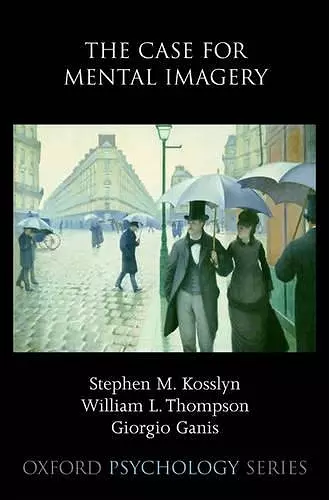The Case for Mental Imagery
William L Thompson author Stephen M Kosslyn author Giorgio Ganis author
Format:Hardback
Publisher:Oxford University Press Inc
Published:23rd Mar '06
Currently unavailable, and unfortunately no date known when it will be back
This hardback is available in another edition too:
- Paperback£37.49(9780195398977)

Mental imagery has always been a controversial topic in psychology. The major problem has been the inherently private nature of mental images, which has traditionally prevented objective assessment of their structure and function. Between researchers in cognitive psychology and computer-science, a debate, now commonly called 'the imagery debate' arose about what exactly constitutes a mental image. Although the imagery researchers in cognitive psychology assumed that mental images were in fact images, and hence often compared them to pictures, the computer-science researchers relied on language-like internal representations that are easy to implement in programming languages. On the side of the computer-science researchers, Zenon Pylyshyn has argued that the picture metaphor underlying theoretical discussions of visual mental imagery is seriously misleading, particularly because it suggests that an image is an entity to be perceived. Pylyshyn has claimed that to describe what we know adequately, we must posit mental structures that describe, that are conceptual and propositional in nature, rather than sensory or pictorial-symbolic descriptions, rather than images. On the side of the mental-imagery researchers, Stephen Kosslyn has argued that the idea that mental depict, as opposed to describe, is not only defensible, but most consistent with the emerging body of data about imagery. In this volume, Stephen Kosslyn revisits the debate some 30 years later, when it has evolved to bear on a much more general concern: the relation between mental phenomena and underlying natural substrates. Kosslyn summarises the arguments and positions, puts them in context, and shows how modern neuroscientific methods can illustrate the representational nature of mental imagery.
This volume is the most important if not the final word on the great imagery debate. It examines issues critical to all cognition. For example, whether the brain is a general purpose computer and if the brain's structure imposes limits on what can be represented in our minds. * Michael I. Posner, Professor Emeritus, University of Oregon, USA *
ISBN: 9780195179088
Dimensions: 221mm x 277mm x 15mm
Weight: 587g
260 pages